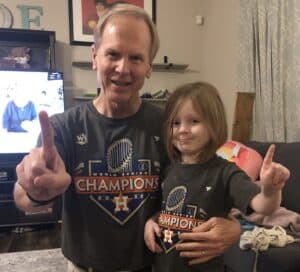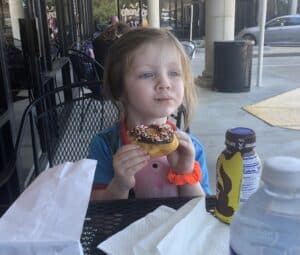The Rest of the Story was a popular radio broadcast by the legendary Paul Harvey from 1976-2009. Paul Harvey would tell a story about a historical figures or events but not let you know who or what it was until the end of the story. He would share all kinds of interesting information that we had never known. He would then tell you the person or event the story was about and would end the broadcast saying the famous line: “and now you know the rest of the story.”
In many ways, our marriages can learn a lot from this “rest of the story” theme. Each of us comes into marriage with our own story but there are many key pieces of our stories that our spouse has not heard. Just as listeners were enlightened by hearing Paul Harvey fill in the gaps of a story, so we can be enlightened to know our partner at a deeper and more meaningful level when we hear their story.
A Key to Healing Conflict
Many times when we get into conflict in our marriages it is because we do not know the rest of the story. In the midst of the conflict, we just know we are in pain and we want it to stop. That is why we so often seem to have the same argument over and over again. The topic may change from time to time, but the familiar pattern of disagreement is the same. Anyone else ever have that experience? Raise your hand so I can see I am not the only one!
The way we can break this cycle is to stop what we are doing and see if there is something more to our partners story that we need to know that is impacting them in the conflict. Also, it would be good for us individually to ask ourselves the same question and to see what is my story and why am I having difficulty handling this conflict better.
When we are in conflict, at the core is an underlying pain. It’s no fun talking about it but dealing with and understanding our own pain and the pain of our partner is vital to breaking the “here we go again” cycle and finding a place of healing. After all, I don’t remember any conflicts I’ve gotten into where I was fighting because I was experiencing joy!
A Story of Loss
A helpful way to know your story and your spouses’ story is to begin to identify the losses in your life. Life is a series of losses and with those losses come pain. Most of us were never really taught about loss and how to process them so we end up in the present carrying a bundle of losses and their corresponding pain. Often, we are not even aware of this bundle we are carrying. If we look at our conflict constructively, we can allow God to help us unpack our bundle and to see if there are any unresolved losses that we are carrying around. As we begin to unpack our bundle, we start to find key elements to help us tell the rest of our story. When this happens, healing can begin and our bundle gets lighter.
Unpacking our Bundles of Loss
So how do we go about unpacking our bundle of losses? First, we have to be able to recognize we have one. For many of us, our way of dealing with loss was to ignore, stuff, or just “push on”. We are so good at this we can be convinced we don’t have losses. But we do, we all do. If you have lived life on planet earth, in a Genesis 3 world, you have experienced loss. Here are a few examples of events that happen to us that are loaded with loss:
- Death of a loved one
- Death of a pet
- Divorce(death of a marriage)
- Job loss
- Moving to a new location
- Change of career
- Difficulty in raising children
- Difficulty in caring for aging parents
- Stuck in a job
- Health issues
Once you recognize you have losses, make a list of losses you have experienced. Then with each loss, take some time with God and process the meaning each of the loss. Ask yourself some questions like: “What was the event?”, “How did you feel?”, “How did you cope?”, “How is it impacting me now?”.
Once you have identified and processed the loss, bring it all before the Lord and allow Him to comfort you and heal the wounding of this loss. There is great healing that can take place when we mourn our losses.
Blessed are they that mourn: for they shall be comforted. (ESV)
You’re blessed when you feel you’ve lost what is most dear to you. Only then can you be embraced by the One most dear to you. (MSG)
Matt 5:4
A Place of Comfort
Jesus gives us such a picture of what life in the Kingdom of God is like for those who have suffered loss. We can and will receive comfort. That’s the kind of Father we have. There is no loss too small, too silly, or too shameful that you cannot bring to your heavenly Father. He promises to bless you in your loss and provide a comfort that can bring you healing. But, we have to ask for it. For all you guys out there, that can be a scary thing. It goes against the “bro code” to show emotion or do anything that reflects weakness. But it is only in our weakness that we can experience the power of Christ to help us heal and experience comfort. Paul gives us some advice:
But he said to me, “My grace is sufficient for you, for my power is made perfect in weakness.” Therefore I will boast all the more gladly of my weaknesses, so that the power of Christ may rest upon me."
2 Corinthians 12:9
I love the idea of marriage being a place of comfort. What a different way to look at conflict, when we understand that it is really an indication of pain and loss with a remedy of comfort. One of my favorite books on marriage is “How We Love“ by Milan and Kay Yerkovich. At the core of their teaching is the idea of the comfort circle. It is a place where husband and wife can learn to bring their pain and the experience of loss and ask for comfort from each other. In the comfort circle, we begin to hear the rest of the story.
For example, a loss I have identified in my life that has had a huge impact on how I communicate in marriage is the loss of acceptance. I had wonderful and loving parents but in the process of correction and discipline I came away with a feeling of not being good enough. For years I would react and express frustration at being criticized and was blind to the loss I felt deep down of not being accepted. When I was able to identify and mourn that loss, I was able to respond in my marriage in a more healthy and Christlike manner. Being able to recognize this and share it with Wendy has allowed me to enter the circle of comfort where we can experience healing and freedom together.
Jesus said, “Blessed are they that mourn, for they shall be comforted”. May we learn to experience this blessedness of comfort in our marriages as we mourn our losses and learn the rest of our stories together!
Practice
A good time to practice the comfort circle is when you are not in conflict! Spending time in the comfort circle proactively is a wonderful way to invest in your marriage and promote healing and intimacy. When you get in the habit of doing this during normal times, it will be a little easy to adopt when the conflict hits. One thing to try is to separately think about a loss that may still be impacting you that you have not had the opportunity to process. Then get together and take turns sharing what God has shown you. As you listen keep your circle safe by just listening, no fixing, explaining, or trying to relate. Sit with your spouse in their mourning and let Jesus do the healing.
If you want to go deeper and explore the idea of mourning losses, may I recommend the podcast below? The speaker is Trevor Hudson, who is one of the speakers we had at our last Renovaré Institute retreat. What a blessing a man Trevor is. In this podcast, he uses the story of Jesus meeting Mary at the tomb to describe how we can learn to identify and mourn our losses. Find at least an hour where you can get away and be quiet. Listen to the podcast and let the Holy Spirit speak to your heart about mourning.
Just click on the image below to access the podcast.








